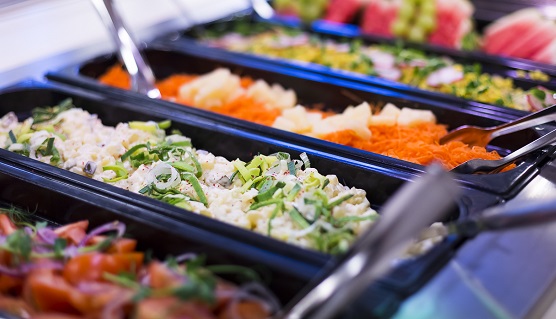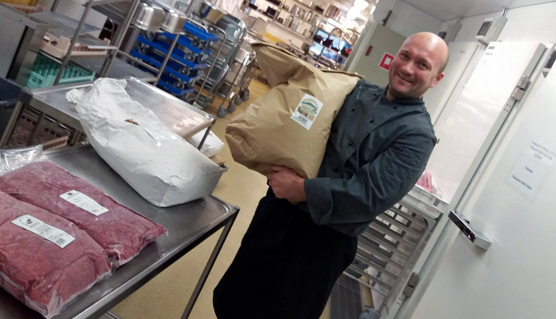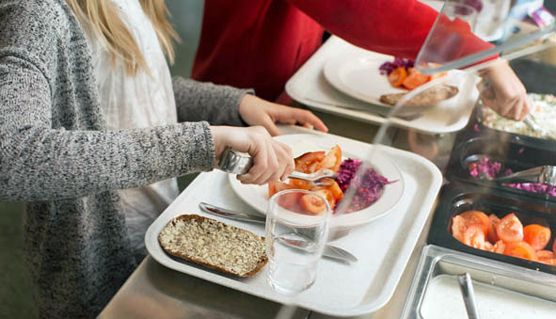
© Helsinki Service Centre
The Just food project cooperates with Helsinki Service Centre and the food services in Muurame to find ways of promoting environmentally-friendly eating at schools. Leijona Catering participates in testing and examining the solutions.
Public food providers are expected to serve environmentally-friendly food that is both healthy and delicious. Just food seeks to find feasible solutions by listening to the customers and hearing their opinion on where the problems are.
“There is no one solution, but we must find a range of means for making the food offered by food services more diverse, taking into account different customer groups,” Minna Kaljonen, Principal Investigator of the project at the Finnish Environment Institute says.
Results and reciprocal knowledge-sharing through joint development
During the project, the researchers generate information on the environmental impact of food products. The produced information can be used in the planning of menus, in the service providers’ own production control systems and procurement. In Helsinki, the project is linked to the implementation of the Carbon-neutral Helsinki action plan. In accordance with the plan, Helsinki Service Centre has agreed to develop new plant-based recipes, increase the share of vegetarian food and reduce food waste.
“As a researcher, I am interested in the impact that research has, and the best thing about this project is that it gives us feedback from the field at an early stage. This makes our job easier and more efficient. It also motivates us greatly,” says Jani Salminen, Head of Unit at Finnish Environment Institute who is responsible for the environmental impact assessment in the project.
What does the just food transition mean in food services?

Ilja Saralahti serving locally produced food. © Muurame
The joint study gives voice to the customers. The students are asked how they would develop school food to make it more environmentally-friendly. They also get to test new recipes. The bottom line is that food must taste good and be healthy so that people eat it instead of throwing it away. In order to prevent food waste, it is important that the change is not too dramatic for people from different backgrounds.
For the food service providers in the project, just transition is also an opportunity to act as a pioneer and set an example for others. The outcome of the project is something tangible and understandable with potentially large-scale impacts in the future. The aim is to spread the good experiences and lead the way across Finland.
“It is wonderful to be part of developing something as important as this on a practical level. Being in the forefront of change and setting an example for others is also important for me,” Ilja Saralahti, Catering Manager at Muurame food services says.
An important goal is to support political decision-making by producing research-based information, not only looking at things from the point of view of Helsinki but also examining environmental impacts justly and comprehensively from the perspective of Finnish agriculture.
“At the moment, there is no comprehensive model for measuring the climate impacts of food. This project generates research-based information on the environmental impacts, which will improve the credibility and transparency of our operations. We can reference the studies and show how certain foods are better for the climate than others,” Eeva Saarinen, Food Services Development Manager at Helsinki Service Centre says.
How to implement the just food transition in practice?

Students having lunch. © Helsinki Service Centre
The changes to menus are tested in practice. The practical work begins with an analysis of the initial situation, starting with the environmental impacts and carbon footprint of menus and food supplies. The project looks for environmentally-friendly solutions and develops new recipes, paying attention to the students’ opinions.
Involving the students is important in the project. The students are asked to rate the dishes, and measures are taken to make the food as appealing as possible. The schools will organise food workshops where the students can present their views, test new recipes and discuss the environmental impact of food.
“It is great that we get communication material from the project that we can use to educate our students. They can then share it at home and spread the word. This is important in the long term,” Marko Karp, Product Designer at Helsinki Service Centre says.
More information
- Principal Investigator of Just food project, Senior Research Scientist Minna Kaljonen, Finnish Environment Institute, firstname.lastname@ymparisto.fi
- Researcher, Head of Unit Jani Salminen, Finnish Environment Institute, firstname.lastname@ymparisto.fi
- Catering Manager Ilja Saralahti, Muurame, firstname.lastname@muurame.fi
- Food Services Development Manager Eeva Saarinen, Helsinki Service Centre, firstname.lastname@hel.fi
- Product Designer Marko Karp, Helsinki Service Centre, firstname.lastname@hel.fi